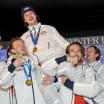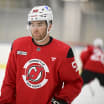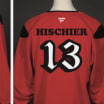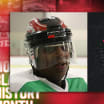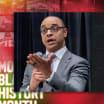The New Jersey Devils franchise was not born with ease.
Not when you consider that birth pangs originally were felt in Kansas City. Then they increased in Denver and finally resulted in a brand new major league hockey club bursting forth in the Garden State's Meadowlands.
Rest assured that the National Hockey League didn't plan it this way; far from it. And since, I was covering the story from the get-go four decades ago, let me explain how the K.C. to Colorado to East Rutherford saga evolved.
After the NHL's Original Six to twelve team expansion of 1967-68, the league's growth was closely followed by the addition of teams in Buffalo and Vancouver. Success whet the owners' appetite and they added another pair -- the Islanders and Flames -- for 1972-73. But that's when things got hairy in hockey Paradise.
Launched with the 1972-73 campaign, the renegade World Hockey Association began siphoning off such NHL stars as Bobby Hull, Derek Sanderson and Gerry Cheevers. Had the NHL not been able to withstand the traumatic WHA incursion it's conceivable that there never would have been a New Jersey Devils franchise.
But the NHL remained bullish about its future and next accepted bids from Kansas City and Washington for play in 1974-75 at a cost of $6 million for each franchise. In K.C, the new hockey Scouts would play in a spanking, fresh Kemper Arena while the D.C.Capitals moved into a new rink, Capital Centre, in suburban Landover, Maryland.
Saddled with few stars, each baby franchise struggled although -- relatively speaking -- the Scouts did well compared to the new D.C. outfit. But, as they say, turnabout is fair play, so a year later the Caps were much improved while the Scouts floundered on the ice and -- ouch! -- at the gate.
How the Scouts and Rockies Became the Devils | 40 YEARS WITH STAN
The New Jersey Devils franchise was not born with ease and Stan Fischler takes you through the story
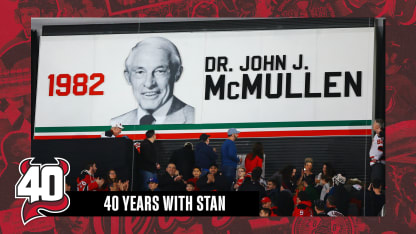
In fact, the Missouri sextet literally was shown the gate as the league fathers deemed that a move was necessary and that's how, after just two terrible seasons, the Kansas City Scouts re-emerged as the Denver-based Colorado Rockies.
All things considered, Denver seemed like a win-win situation for NHL fathers.
The Mile High City had a rich hockey history and an impressive ice palace called McNichols Arena. But what it lacked was what it needed most -- a winning team.
Under coach Johnny Wilson, the Rockies finished last in the Smythe Division
(20-46-14) and had precious little in the way of luminaries to inspire the minimal fan base. Fortunately for the Rockies competition was not keen in the Smythe Division for 1977-78 and, somehow, the Rockies wound up in second place -- despite a sick mark of 19-40-21 for a measly 59 points.
No matter. Johnny Wilson's replacement behind the bench, Pat Kelly, was a savvy coach and almost produced a miracle in the opening playoff round against the powerful Philadelphia Flyers. In the opening game of the best-of-three series, Kelly's guys pushed the Flyers to a 2-2 deadlock in regulation but blew their chance for an upset in overtime: 3-2 Philly followed by 3-1 Philly and the Rockies were rocked, but good.
Colorado ownership then tried a series of coaches from the sage, cool Aldo Guidolin to the bombastic, headline-grabbing Don (Grapes) Cherry, but nobody and nothing worked, except Cherry's assortment of wisecracks such as, "Our goalie problems weren't big; they were colossal!"
Don got the boot before the 1980-81 season, replaced by Billy MacMillan. Meanwhile, New Jersey trucking executive Arthur Imperatore had purchased the team and slowly -- inexorably -- the possibility of a Garden State NHL franchise became the light at the end of the NJ Transit tunnel.
A new arena was being blueprinted for East Rutherford and Imperatore petitioned NHL owners to approve a relocation of the Rockies to New Jersey. But there was a major roadblock and it wasn't the NJ Turnpike either.
Moving a team at that time required the unanimous agreement of all 21 NHL clubs. At least three -- Rangers, Islanders, Flyers -- promised to veto any attempt to add a franchise to the Metro Area market.
If that wasn't enough trouble, the Rangers -- battling New York City over taxes -- threatened to move the Blueshirts out of Madison Square Garden to the new rink in East Rutherford.
Frustrated and infuriated, Imperatore said -- in so many well-chosen non-Good
Housekeeping words -- the heck with this and in February 1981 he sold his club to Buffalo television magnate Peter Gilbert.
Gilbert's migraines began when the MacMillan coached club missed the playoffs by a Colorado mile and -- incredulously -- Billy Mac was promoted to general manager. Ex-NHL defenseman Bert Marshall was given the dubious distinction of becoming another losing coach but only for 24 tedious -- 3-17-4 -- games.
Marshall Johnston answered the get-us-another-coach S.O.S. while owner Gilbert flashed his own S.O.S. around Millionaire's Row; seeking a new owner.
In two shakes of a lamb's tail, a saviour showed up; only this time the sugar daddy was the real goods. He had the passion; he was all New Jersey and he had the bankroll to, once and for all, make the fumbling franchise work.
Dr. John McMullen was renowned in sporting circles as a part owner of the New York Yankees and later owner of the Houston Aeros. His vim, vigor and vitality was infectious as was his no-applesauce rhetoric.
A bevy of Hollywood casting directors couldn't have fashioned a more "Mister New Jersey" character actor than Doc Mac. He graduated from Montclair High School, and eventually the Naval Academy before serving heroically in World War II. He later established a successful naval architecture and marine engineering concern, John J. McMullen Associates.
His passion for New Jersey was matched only by his love of sports. When the Devils were up for sale, Doc Mac was convinced that his home state could support a team at The Meadowlands. So were his partners, led by former New Jersey governor Brendan T. Byrne and financier John C. Whitehead.
On May 27, 1982, McMullen cleared all the league hurdles and officially was awarded the Meadowlands franchise. Equally jubilant were members of the New Jersey Sports and Exhibition Authority which would operate the mammoth arena.
"We're very pleased," said Robert E. Mulcahy III, the Authority's chief executive officer. "We've been working for years to try to get a team."
No less exultant were members of the refugee Rockies who soon would find themselves adorned with new sweaters and a brave new world of hockey. One of them was Glenn (Chico) Resch who had played on the 1980 Stanley Cup-winning Islanders before being dealt to Colorado.
"We were overjoyed," Resch remembered, "because everything was going to be new in New Jersey -- a new arena, new fans, new spirit and new hope for making the playoffs. John McMullen had hit the jackpot and, to a man, we couldn't wait for the opening of training camp.
"Not only that but we wondered what they were going to name the team. Scouts and Rockies were losers; we were looking for something fresh and fun!"
That soon would come as The New Jersey Devils!

